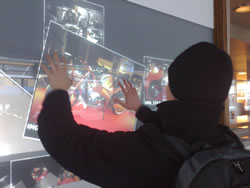
Homeland Security testing mind-reading terrorist 'pre-crime' detectors

So whether someone cut you off in traffic or you had a spat with your significant other, if you are having adrenaline-driven aggressive thoughts and you are in northeastern USA, you might quickly take a chill pill because that's where terrorist "pre-crime" detectors are being tested by the Department of Homeland Security (DHS).
According to Nature magazine, in an undisclosed location in the northeast, Homeland Security has been testing its Future Attribute Screening Technology (FAST) program which is designed to 'sense' and spot people who intend to commit a terrorist act. Critics of FAST have compared the system to the 'pre-crime' concept that was made famous in the film Minority Report. FAST technology uses remote sensors to detect when a person experiences irregular physiological properties like increased heart rate and darting eye movements that are supposedly associated with malicious intent.
FAST merges technology with behavioral science [PDF] and has been in development since 2008. According to the DHS privacy impact document, there are five remote sensors that can measure heart and respiration rates, and remote eye trackers that can measure pupils, position and gaze of eyes. There are also thermal cameras as well as audio to analyze pitch changes in human voices. High resolution video is used to analyze facial expressions and body movement. "Other sensor types such as pheromones detection are also under consideration." Previous FAST testing involved people passing through the system while role-playing that they would carry out a "disruptive act."
As TechEye noted, "DHS claimed the machine was accurate 70 percent of the time [and] the other 30 percent will probably get out of Guantanamo Bay in a couple of years."
DHS has compared FAST to lie detector tests, except it does not involve active questioning of the subject. The non-contact sensors measure sweating and the steadiness of a person's gaze to judge state of mind. Although there is no mention of 'precog' mutants like in Minority Report, it does bring to mind the pre-crime program from the movie. Aren't terrorists trained to avoid detection and possibly beat lie detector tests?
Tom Ormerod, a psychologist in the Investigative Expertise Unit at Lancaster University, UK, told Nature, "Even having an iris scan or fingerprint read at immigration is enough to raise the heart rate of most legitimate travelers." Other critics have been concerned about "false positives." For example, some travelers might have some of the physical responses that are supposedly signs of mal-intent if they were about to be groped by TSA agents in airport security.
Yes, FAST is much more advanced than a "mood ring" or stress detector, but for people who feel like false positives can grind against the grain of liberty, then perhaps attempt to be very mellow in public? If you don't travel much, then let's hope that experienced security or customs agents can use their better judgment to determine that is why you are nervous
June 1, 2011
